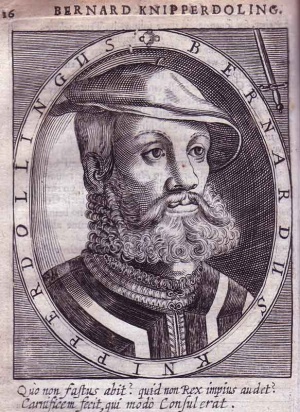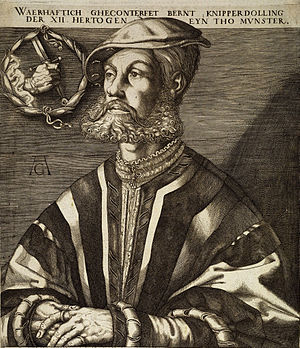Difference between revisions of "Knipperdolling, Bernt (ca. 1490-1536)"
| [checked revision] | [checked revision] |
m |
m |
||
| Line 1: | Line 1: | ||
[[File:Knipperdoling.jpg|300px|thumb|right|''Engraving from Apocalypsis, or The revelation of certain notorious advancers of heresie. London, 1655. Scan provided by the | [[File:Knipperdoling.jpg|300px|thumb|right|''Engraving from Apocalypsis, or The revelation of certain notorious advancers of heresie. London, 1655. Scan provided by the | ||
[https://uwaterloo.ca/mennonite-archives-ontario/ Mennonite Archives of Ontario].'']] | [https://uwaterloo.ca/mennonite-archives-ontario/ Mennonite Archives of Ontario].'']] | ||
| − | [[File:Knipperdolling.jpg|300px|thumbnail|''Bernt Knipperdolling, engraving originally by Heinrich Aldegrever. Source: Wikimedia Commons'']] | + | [[File:Knipperdolling.jpg|300px|thumbnail|''Bernt Knipperdolling, engraving originally by Heinrich Aldegrever. <br /> |
| + | Source: [https://commons.wikimedia.org/wiki/File:Knipperdolling.jpg Wikimedia Commons].'']] | ||
Bernt (Bernhard) Knipperdolling, a <span>leader of the </span>[[Anabaptism|Anabaptists]]<span> in </span>[[Münster Anabaptists|Münster]], [[Westphalia (Germany)|Westphalia]], [[Germany]], was a prosperous clothing merchant. His home was located near St. Lambert's Church. He is first mentioned in 1527 when he helped to free Tonies Kruse, who had been imprisoned by the bishop. When the evangelical movement spread in Münster he joined it, particularly in supporting [[Rothmann, Bernhard (ca. 1495- ca. 1535)|Bernhard Rothmann.]] When the bishop and the city council lost their influence through the democratic Anabaptist movement, Bernhard Knipperdolling was elected mayor in February 1534. He became a staunch supporter of Jan Matthys and [[Beukelszoon, Jan (ca. 1509-1536)|Jan van Leyden]] when they arrived. Both were guests in his home. Jan van Leyden married Knipperdolling's daughter. After the 12 elders appointed by Jan van Leyden took over the government, he lost his office as mayor but remained the special representative of Jan van Leyden. When Jan van Leyden proclaimed himself king, Knipperdolling was opposed but finally yielded. After the defeat of Münster he was found in a hiding place and shared the fate of Jan van Leyden and [[Krechting, Bernd (d. 1536)|Bernhard Krechting]], who were cruelly tortured to death on 23 January 1536. The corpses were hung in the tower of St. Lambert's Church. Numerous portraits of Knipperdolling--paintings, woodcuts, etchings, etc. were produced by artists like H. Aldegrever and Ch. van Sichem (Geisberg). | Bernt (Bernhard) Knipperdolling, a <span>leader of the </span>[[Anabaptism|Anabaptists]]<span> in </span>[[Münster Anabaptists|Münster]], [[Westphalia (Germany)|Westphalia]], [[Germany]], was a prosperous clothing merchant. His home was located near St. Lambert's Church. He is first mentioned in 1527 when he helped to free Tonies Kruse, who had been imprisoned by the bishop. When the evangelical movement spread in Münster he joined it, particularly in supporting [[Rothmann, Bernhard (ca. 1495- ca. 1535)|Bernhard Rothmann.]] When the bishop and the city council lost their influence through the democratic Anabaptist movement, Bernhard Knipperdolling was elected mayor in February 1534. He became a staunch supporter of Jan Matthys and [[Beukelszoon, Jan (ca. 1509-1536)|Jan van Leyden]] when they arrived. Both were guests in his home. Jan van Leyden married Knipperdolling's daughter. After the 12 elders appointed by Jan van Leyden took over the government, he lost his office as mayor but remained the special representative of Jan van Leyden. When Jan van Leyden proclaimed himself king, Knipperdolling was opposed but finally yielded. After the defeat of Münster he was found in a hiding place and shared the fate of Jan van Leyden and [[Krechting, Bernd (d. 1536)|Bernhard Krechting]], who were cruelly tortured to death on 23 January 1536. The corpses were hung in the tower of St. Lambert's Church. Numerous portraits of Knipperdolling--paintings, woodcuts, etchings, etc. were produced by artists like H. Aldegrever and Ch. van Sichem (Geisberg). | ||
Revision as of 21:36, 23 November 2014

Bernt (Bernhard) Knipperdolling, a leader of the Anabaptists in Münster, Westphalia, Germany, was a prosperous clothing merchant. His home was located near St. Lambert's Church. He is first mentioned in 1527 when he helped to free Tonies Kruse, who had been imprisoned by the bishop. When the evangelical movement spread in Münster he joined it, particularly in supporting Bernhard Rothmann. When the bishop and the city council lost their influence through the democratic Anabaptist movement, Bernhard Knipperdolling was elected mayor in February 1534. He became a staunch supporter of Jan Matthys and Jan van Leyden when they arrived. Both were guests in his home. Jan van Leyden married Knipperdolling's daughter. After the 12 elders appointed by Jan van Leyden took over the government, he lost his office as mayor but remained the special representative of Jan van Leyden. When Jan van Leyden proclaimed himself king, Knipperdolling was opposed but finally yielded. After the defeat of Münster he was found in a hiding place and shared the fate of Jan van Leyden and Bernhard Krechting, who were cruelly tortured to death on 23 January 1536. The corpses were hung in the tower of St. Lambert's Church. Numerous portraits of Knipperdolling--paintings, woodcuts, etchings, etc. were produced by artists like H. Aldegrever and Ch. van Sichem (Geisberg).
See also Münster Anabaptists
Bibliography
Cornelius, Carl. A. Historische Arbeiten vornehmlich zur Reformationszeit. Leipzig, 1899: 99-101.
Cornelius, Carl A. Berichte der Augenzeugen über das Münsterische Wiedertaüferreich. Münster, 1853.
Hege, Christian and Christian Neff. Mennonitisches Lexikon, 4 vols. Frankfurt & Weierhof: Hege; Karlsruhe: Schneider, 1913-1967: v. II, 514.
Keller, Ludwig. Geschichte der Wiedertaüfer und ihres Reichs zu Münster. Münster, 1880: passim.
Kühler, Wilhelmus Johannes. Geschiedenis der Nederlandsche Doopsgezinden in de Zestiende Eeuw. Haarlem: H.D. Tjeenk Willink, 1932: see Index.
Allgemeine Deutsche Biographie. Leipzig, 1875-1912: XVI: 293.
Geisberg, M. Die Münsterischen Wiedertaüfer und Aldegrever. Strasbourg, 1907.
Mellink, Albert F. De Wederdopers in de noordelijke Nederlanden 1531-1544. Groningen: J.B. Wolters, 1954.
| Author(s) | Cornelius Krahn |
|---|---|
| Date Published | 1957 |
Cite This Article
MLA style
Krahn, Cornelius. "Knipperdolling, Bernt (ca. 1490-1536)." Global Anabaptist Mennonite Encyclopedia Online. 1957. Web. 12 Feb 2026. https://gameo.org/index.php?title=Knipperdolling,_Bernt_(ca._1490-1536)&oldid=127352.
APA style
Krahn, Cornelius. (1957). Knipperdolling, Bernt (ca. 1490-1536). Global Anabaptist Mennonite Encyclopedia Online. Retrieved 12 February 2026, from https://gameo.org/index.php?title=Knipperdolling,_Bernt_(ca._1490-1536)&oldid=127352.
Adapted by permission of Herald Press, Harrisonburg, Virginia, from Mennonite Encyclopedia, Vol. 3, p. 208. All rights reserved.
©1996-2026 by the Global Anabaptist Mennonite Encyclopedia Online. All rights reserved.

